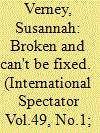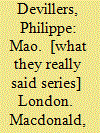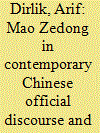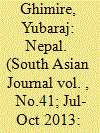| Srl | Item |
| 1 |
ID:
129944


|
|
|
|
|
| Publication |
2014.
|
| Summary/Abstract |
The Greek election of May 2012 failed to produce a government, resulting in repeat elections six weeks later. This shock outcome was a symptom of a broader delegitimation of the national political system. Over the past decade Eurobarometer data show a much more extensive loss of confidence in political institutions in Greece than in the European Union as a whole. In a first phase, rising political discontent was managed within the traditional political framework through alternation in power between the two major parties. In contrast, the second phase, following the outbreak of the Greek sovereign debt crisis, led to the dramatic fragmentation of the party system and changed the mode of government formation. This process is not reversible and entails serious democratic dangers.
|
|
|
|
|
|
|
|
|
|
|
|
|
|
|
|
| 2 |
ID:
023964


|
|
|
|
|
| Publication |
London, MacDonald, 1969.
|
| Description |
317p.Hbk
|
| Standard Number |
35602640X
|
|
|
|
|
|
|
|
|
|
|
|
Copies: C:1/I:0,R:0,Q:0
Circulation
| Accession# | Call# | Current Location | Status | Policy | Location |
| 003634 | 923.10951/DEV 003634 | Main | On Shelf | General | |
|
|
|
|
| 3 |
ID:
113766


|
|
|
|
|
| Publication |
2012.
|
| Summary/Abstract |
Rather than repudiate Mao's legacy, the post-revolutionary regime in China has sought to recruit him in support of "reform and opening." Beginning with Deng Xiaoping after 1978, official historiography has drawn a distinction between Mao the Cultural Revolutionary and Mao the architect of "Chinese Marxism" - a Marxism that integrates theory with the circumstances of Chinese society. The essence of the latter is encapsulated in "Mao Zedong Thought," which is viewed as an expression not just of Mao the individual but of the collective leadership of the Party. In most recent representations, "Chinese Marxism" is viewed as having developed in two phases: New Democracy, which brought the Communist Party to power in 1949, and "socialism with Chinese characteristics," inaugurated under Deng Xiaoping and developed under his successors, and which represents a further development of Mao Zedong Thought. The Hu Jintao leadership has made an aggressive effort to portray "Chinese Marxism" as the most advanced development of Marxism that might also serve as a model for others. These interpretive operations have salvaged Mao for the national revolution and the legitimacy of the Communist Party. But it also presents a predicament in keeping alive memories of Mao's policies, which the Party is not always able to control in political memory, as has been illustrated most recently in the Chongqing experiment.
|
|
|
|
|
|
|
|
|
|
|
|
|
|
|
|
| 4 |
ID:
123681


|
|
|
| 5 |
ID:
167236


|
|
|
|
|
| Summary/Abstract |
Turkey’s recent slide into authoritarianism will have implications for its close neighbours in the West. Especially Greece cannot avoid negative spill-over effects. A coalition government comprising Syriza and Independent Greeks does not have an unconstrained set of policy choices in responding to this. Maintaining effective working relations is a paramount interest but achieving this is easier in principle than in practice especially considering the issues of asylum seekers and Turkish revisionism on the Lausanne Treaty. Unlike the two parties that dominated the Greek political scene after 1974, PASOK and New Democracy, the current government has little experience navigating choppy diplomatic seas with Turkey.
|
|
|
|
|
|
|
|
|
|
|
|
|
|
|
|